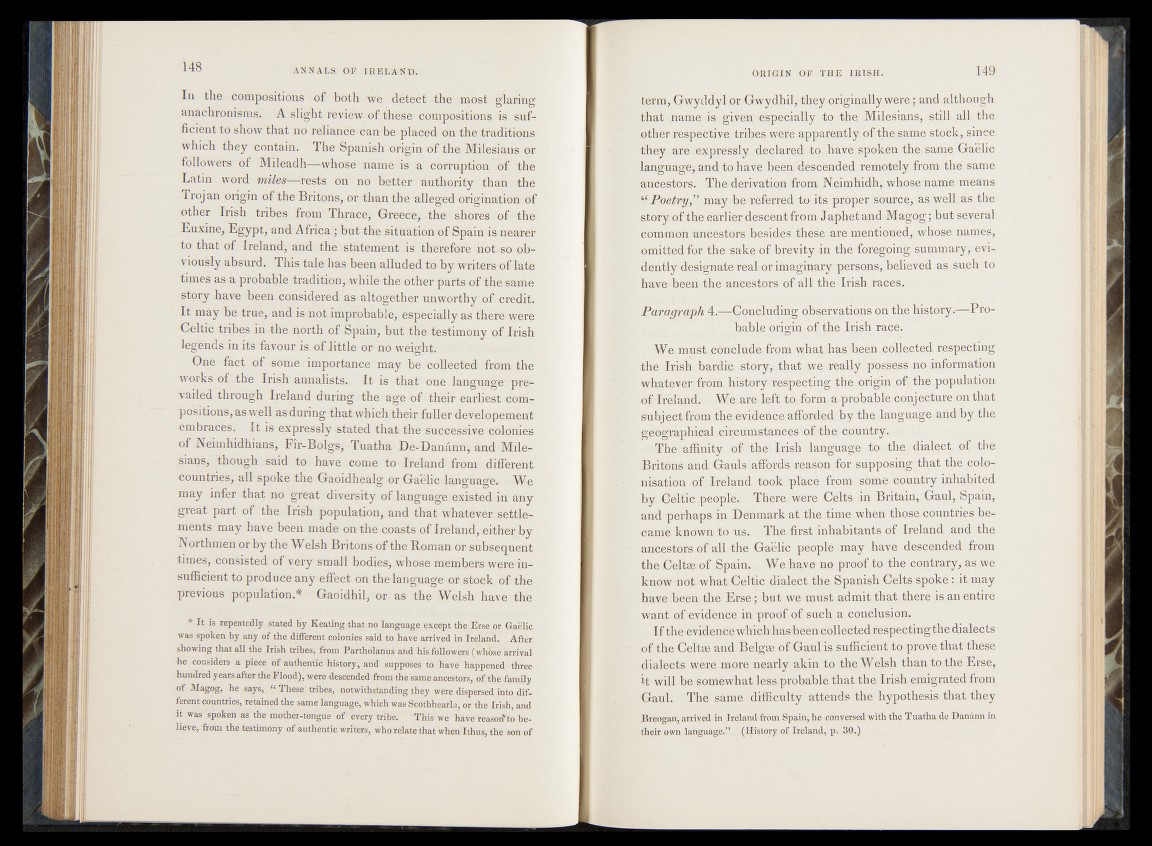
In the composition# of both we detect the most glaring
anachronism#, A slight téview of these compositions isfe, sufficient
to show; that no relianch^eanbe placed on thertraditions
which thèy contain. The Spanish origin of the Milesians or
followers of Milead&^-wh'ose mame is a corruption "of the
Latin - word miles—rests on no better authority tham the
Trojan origin of the Britons, or than the alleged origination of
other Irish tribes from Thrace, Greece, thé'' shores of the
Euxine, Egypt, and Africa ; but the situation of Spain is nearer
to that of I reland,'and the statement is therefore not; so-obviously
absurd. This tale has been alluded to by writers o f late
- times as a probable1 tradition; while-the other parts of the same
story have.been considered: as altogether unworthy. of?.credit.
It may be true, and is not,improbable,^especially as there were
Celtic tribes in-the north of Spain, but the testimony of Irish
legends in its favour is of little or "no weight.
One fact of some importance may be collected .;from the
works of the Irish annalists. I t is that one language?! pre^-
vailed through Ireland during the age of their earlièst compositions,
as well as during that which their fuller deyelopement
embraces. It is expressly -stated that the sbç©e;ési*vé colonies
of Neimhidhians, Fîr-Bolgsr Tuatha De-Danarm, and-Mhler
sians, though said to have come to Ireland;Trom different
countries, all spoke the Gaoidhealg or Gaelic language. We
may infer that no great diversity of language existed in any
great part of the. Irish population, and that whatever?settlements
may have been made on the coasts of Ireland, either bÿ
Körthnren or by the Welsh Britons of the Roman or subsequent
times; consisted of very small bodies, whose members were insufficient
to produce any effect on the language or stock of the
previous population* Gaoidhil, or. as the Welsh have.dbe
;* ^ is repeatedly stated by Keating that no language except the Erse or Gjaëlic
was-spoken by any of the different colonies said to have arrived in Ireland. After
showing that all the Irish tribes, from Partholanus and his followers (whose arrival
he considers a piece of authentic history, and supposes to haye happened three
hundred years after the Flood), were descended from the same ancestors, of the family
of Magog, he says, ‘/These tribes, notwithstanding they were dispersed into.dif-
ferent countries, retained the same language, which was Scotbhearla, or the Irish, and
it was spoken as the mother-tongue o f every tribe. This we have reason'to be-
lieve, from the testimony of authentic writers,, who relate that when Ithus, the »on of
term, Gwyddyl or Gwydhil;; they originally were ; and although
that name is-givemd§ped®aily to,the Miiesiaiis, still all the
erÆesptective tribesiwere1 apparently, of the-samstock3 since?
they, are expressly,.dpeferedl. to have spoken the same Gaelic
language; and to hate ^.en^ldesccuded remotely from the same
ancestors. - The derivatjon^ïrèay Neimhidh, whorse name means
“Poetry,” maybe referred'to its proper ;#qurce,1 as the
sthrÿofthe earlier d^e^t^Fom J a p h è ^ a n d several
common aueestors.be4Î^SfÆhese .are mentioned,s whose names,
Quitted for the sake of brevity in the. foregoing|^|mmary,} evi-.
dently designate reâboKimàginaryipersops, believed ^|^p\ch; to
ha»e*been the aneesitors^Gf allthedrish faces.,.
Paragraph^.—Concluding observations on the history.—Pro-
^ origin .of the Ifisld raep.
Wefmilst concludt^ftpm whatlbas b.een .collestp^^^peeting
the Irishifeardiç istory,\fhat^e^‘.rf^iÿ>i‘ll,9, p | ^ no ibifiwmation
whatever! from h,istofy!fré4pe^ting the .origin of; the population,
of Ireland. Wei are-left i% form u prdbab^^f[||j^tu>re on tha^
subject from the evidenceafforded. by the langj^ge.and by.tlr^
ge’®'^ri;aphicab'cirjCum#tancesiof the 99 un try |
-cThëteiafeè%!M:9.â.itihïei( Irish< ^languages to th,e dialect of.'the
Briton# and Gauls affords reason for supposing that the colo-
msatiom|of Iréland took p lacé'from some-country inhabited
by« Celtic-people^ There »were Ccltst (in Britain, Gaul, ^pajii,
and:ïperhaps in Denmark at the .time whe^/tli^è^eipntries bo-s
came known to us. The first,inhabitants of Ireland and the?
ancestors ©fall the Gaelic peopjeym.ay haye descended 4ro,m
the Celtse of Spain. We have no proof to1 the contrary,;as,wë.
know notJwhat Celtic dialect the'Spanish Celts spoke ;,<,it m.#y
have been the Erse ; but we must admit that there is an entire
want of evidence in proof of such a conclusion* .
If the evidence which has been collected respectingthe dialects
of the Celtæ and Belgse of Gaul insufficient to-prove that these
dialects were more nearly akin to the Welsh than to the Erse,
it will be somewhat,less,probable that the Irish emigrated from
Gaul. The same difficulty attends the hypothesis:that they
Breogan, arrived'in Ireland from Spain, be conversed with the Tuatha de Danânn in,
their own language.” (History of Ireland, p. 30.)